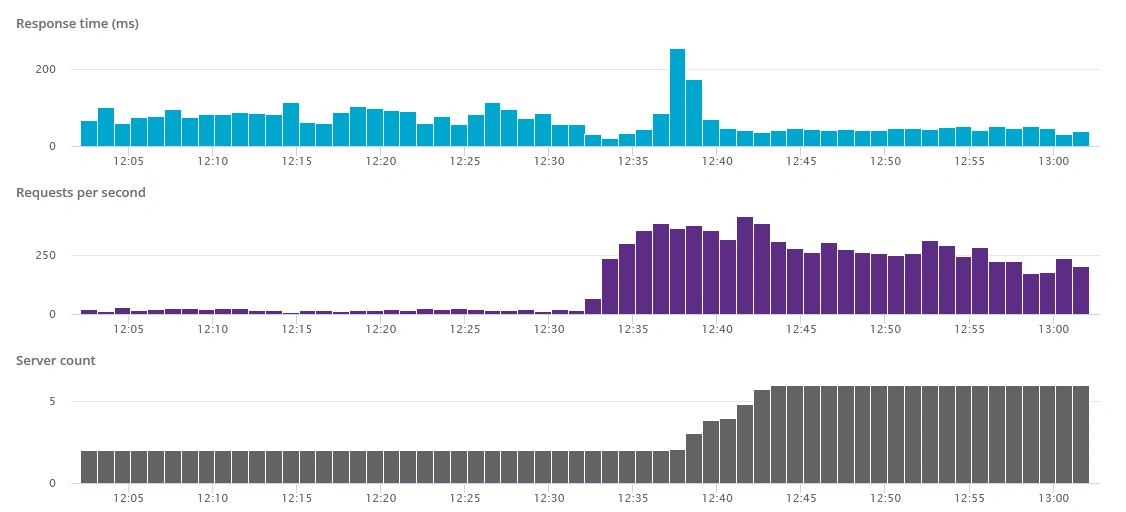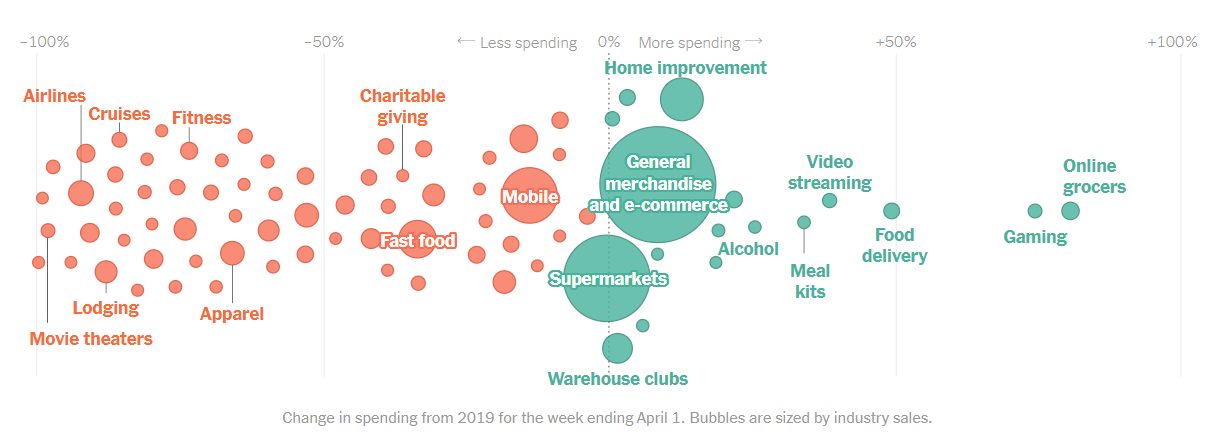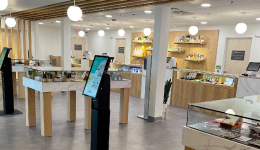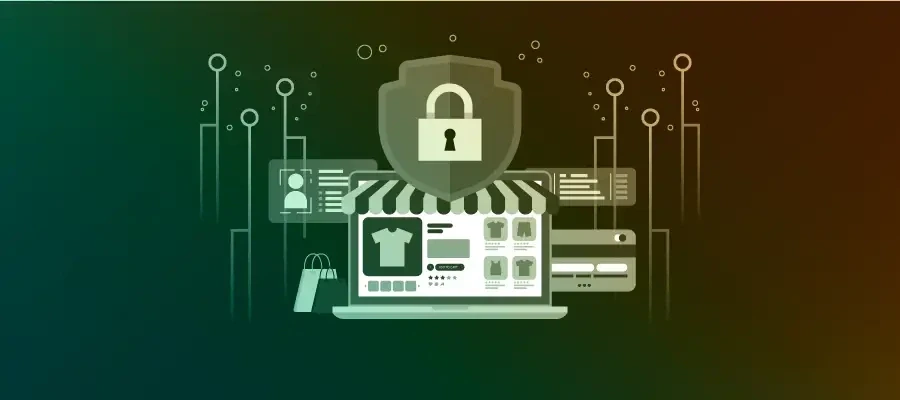Last Updated On: August 3, 2021
Human beings are a resilient lot. We have an innate ability to weather a storm, and find ways to not only survive, but thrive. We’ve seen true heroes step up and save lives, while others selflessly provide support for those in need. Our resilience as a species helps us find a new way forward, while we work as a community to adjust to the new normal of working from home, social distancing, giving up non-essential travel, and ordering (just about everything) online.
I’m guilty of allowing the daily whirlpool of doom and gloom to get to me, so I decided to take a break and look at one of the more interesting side effects of this new reality in which we find ourselves, namely the rise of ecommerce as it fulfils the critical (and non-critical) needs of a nation “staying home”.
As a company that builds software-as-a-service to secure, accelerate and provide resiliency and scale to over 3000+ online storefronts, we have a unique view into this, so we dug into some of the more interesting traffic changes we’ve seen across our global client base over the month of March. Our perspective is unique among service providers, because we are able to see broad changes in consumer behavior across our stores. We do not sell a license or a single tenant deployment, rather an evolved multi-cloud hosting and management experience for all of our customers. The results of our digging were, in equal parts, predictable and somewhat entertaining.
Here’s what we found:
The Obvious Suspects
UPDATE: More industry data is now available to support the early trends we originally identified in this blog. Prior to the pandemic, the penetration of ecommerce into the grocery space lagged other retail sectors. Globally, online grocery saw a significant boost in 2020 accelerated by the restrictions imposed by the pandemic. In 2020, food and drink ecommerce posted 53% growth – the highest of any product category. Euromonitor forecasts that food and drink ecommerce will still expand by 8% in 2021. By 2025, Euromonitor forecasts that online sales will account for 21% of total retail spend. Even without expanding supply chains or logistics networks, growth is possible merely through optimization – the retail market globally could support more than $77.7 billion in additional ecommerce sales without further infrastructure expansion.
As you would expect, essential services have reported sharp spikes in traffic. These include online providers of food and beverages, showing an 80% to 150% increase, as well as online pharmacies and suppliers of natural health and wellness remedies with a 50% to 85% increase. This all makes good sense, and is frankly encouraging, as it indicates a society that, for the most part, is taking social distancing and shelter-in-place restrictions seriously.
And speaking of natural remedies, last Friday was an interesting day for one customer, who specializes in supplies for acupuncture therapists. They offered masks for sale for the first time, experiencing a Black Friday-class event as soon as the email went out. They tripled the size of their infrastructure in a matter of minutes, thanks to Webscale’s predictive auto-scaling technology.

Massive, sudden scale outs for mask sales
Online learning had a whopping 250% increase as expected with schools across the country closing their doors for the balance of the school year. A recent New York Times article, that looked at how Americans are spending their money during the crisis, did a great job of showing the industries that have seen an increase in spend, as well as those that have seen enormous drop-offs. Their graphic is below for easy reference:

Image courtesy of the New York Times
The instability in the stock market has been another major source of concern for many, one that has also triggered dramatic increases in adjacent industries. Webscale supports a number of customers in the gold and silver trading segment as well as fintech brands, and they have seen traffic increases of more than 100%. As stock prices take a nosedive, savers and investors alike are scrambling in a bid to secure long-term purchasing power.

Big spikes in silver trading
And here are the top 5 segments you might not expect to see doing well in a crisis:
1. Exercise equipment and appliance repair (200% increase): A $300 treadmill? It was a second hand bargain, all it needed was a couple of spare parts. Well, that decision was 6 years ago, you never bought them, and now your gym is closed and you need it to work out! Those endorphins aren’t going to produce themselves, and only the sweet sweat of exercise will produce enough of them to prevent you from tying your 6 year old twins to a post in the backyard for the remainder of the day. Yep, that’s right – we have more than a few companies who sell all those bits and bobs you need to fix those aging machines, and they are all seeing huge jumps in traffic. And keeping the washer, dryer, dishwasher and refrigerator running to keep the clothes clean and snacks fresh, especially when your handyman isn’t around, is critical.
2. Intensive body care (50% increase): This one was a head scratcher. Moisturizers and bump erasing body scrubs? They’ve all been in high demand, but as I stared down at my dried knuckles, chalky palms, all fresh and lemon smelling from their 34th washing of the day, it dawned on me. We’re regularly stripping all those natural oils off our hands with far more regularity than ever before. It’s exactly what we should be doing, but it’s clearly taking a toll and intensive hand creams are the order of the day. Even the grocery stores are all out of these products, putting them right up there with food, hand sanitizer and toilet roll! Who would’ve thought it?
3. “Alternative” therapies (500% increase): Doing even better than any of its more conventional cousins in traditional pharmaceuticals, and understandably so surrounded by multiple kids, spouses, partners, parents, grandparents and chores 24/7 for 2 months. Everyone needs a little help now and then, right? Jokes apart though, the best defense against any medical condition or illness is through holistic management, as opposed to symptom treatment or suppression. What better time than now?
4. Meat (150% increase): We’re proud to provide cloud hosting and management to America’s leading suppliers of high quality beef, other meats as well as desserts, and like all food delivery services, they’re seeing a big boost in sales. I mean if you’re feeling down, what better way is there to put a smile on your face than having a couple of Wagyu filets, a pound of chicken wings or maybe a delectable cheesecake turn up on your doorstep? Unless you’re vegan of course, in which case you may be interested in our final item…

Meaty increases in traffic for food suppliers
5. Yoga pants (180% increase): We support a lot of fashion, beauty and retail brands, more than a few of which specialize in relaxed, lounge wear. They’re all seeing a big boost in sales as isolated home bodies seek out the very comfiest of comfies for those warrior poses, downward-facing dogs and cat-cow stretches (yes, it’s a thing, I googled it) – or they just need something forgiving for the four buckets of popcorn they’re going to consume as they wade through the Tiger King Netflix marathon. Stay home, stay relaxed!
We’re hopeful, and we’re here to help.
We don’t mean to make light of this situation. COVID-19 is the most devastating global crisis of our lifetime, and our hearts go out to all affected. But after so much darkness, seeing how people are making the best of their circumstances, brought some much needed light and some amusement.
While there are obvious challenges for ecommerce, the health and safety of warehouse workers, a shortage of delivery personnel, and delayed deliveries to name just a few, merchants are doing what they can to cater to an increasingly fickle consumer and overwhelming demand in a dramatically changing world, with very limited access to human resource and raw material.
In our own way, Webscale is doing what we can to try and help our community. For one, we’ve got our customers’ backs. We’re working closely with all those experiencing difficulties, reworking engagement models and doing whatever else we can, to help keep boats afloat. We understand their situations, and we’ll find a way to help them keep things going well after all this has settled down.
At Webscale, we are here to help and support our partners and our merchants. In the last 5+ years, we have been welcomed into this community and together we will make it through this.













